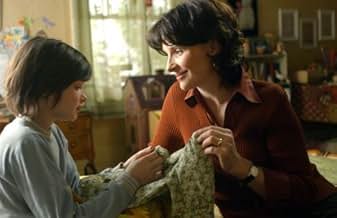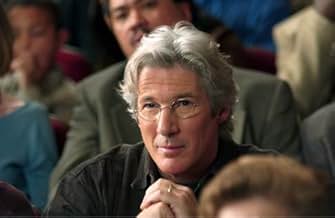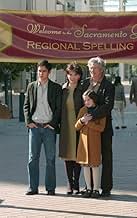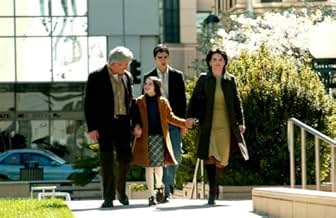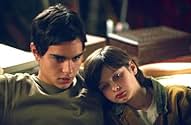Ehefrau und Mutter Miriam beginnt eine emotionale Abwärtsspirale, als ihr Mann das Scheitern ihrer Ehe verhindert, indem er sich in das Bestreben seiner 11-jährigen Tochter vertieft, eine Bu... Alles lesenEhefrau und Mutter Miriam beginnt eine emotionale Abwärtsspirale, als ihr Mann das Scheitern ihrer Ehe verhindert, indem er sich in das Bestreben seiner 11-jährigen Tochter vertieft, eine Buchstabiermeisterin zu werden.Ehefrau und Mutter Miriam beginnt eine emotionale Abwärtsspirale, als ihr Mann das Scheitern ihrer Ehe verhindert, indem er sich in das Bestreben seiner 11-jährigen Tochter vertieft, eine Buchstabiermeisterin zu werden.
- Regie
- Drehbuch
- Hauptbesetzung
- Auszeichnungen
- 1 Nominierung insgesamt
Empfohlene Bewertungen
"Bee Season" co-directed by Scott McGehee and David Siegel feels empty because the somber treatment they have given to the movie. The dark cinematography of Giles Nuttgens doesn't help either, but the musical scores of Peter Nasher works well, as a whole.
One enters the Naumann world through the sensitive Eliza, a girl much older and wiser than her 11 years indicate. It is Eliza who senses all that is wrong with her family, as it appears they are falling apart in front of her, and as a little girl, she simply can't do anything at all to bring everyone together. As a way to escape the unhappy home, Eliza immerses herself in the spelling bee contests in which she excels. Not until then, does she get the attention of her father, who supports her newly found talent.
Saul, the religious studies professor, doesn't even come aware about what's wrong with his marriage until it's too late. In fact, he is a man appears to be unable to communicate with the illusive Miriam, a woman who is deeply disturbed by what happened in her own life with the tragedy of her parents death. Saul and Miriam's marriage is over, but they don't do anything to correct the situation. Miriam's problems come to a head when she is taken away and makes Saul confront the many issues that he probably never dealt with before.
Aaron, the older son, is rebelling against his own religion. He needs to experiment with other beliefs because he is at that stage of his life in which he is trying to find out who he is. That is why when he meets Chali, the young Hare Krishna follower, he decides to follow her in his quest for finding a guidance for his life.
The ensemble playing is dominated by the youngest cast member, Flora Cross, who makes a luminous Eliza. Her expressive eyes and her intelligence tells everything about her. Juliette Binoche's Miriam is a puzzle. Richard Gere does what he can with Saul and Max Minghella has some good moments as Aaron. Kate Bosworth is seen briefly as Chali.
"Bee Season" is a difficult film to sit through because it is a dark look into a family falling apart without a safety net. Also, the way the film has been promoted gives a false impression about its content.
Saul is close to his musically gifted son Aaron (Max Minghella) with whom he shares a love of music but ignores his 11-year old daughter Eliza (Flora Cross) until her talent for spelling is recognized and she wins local and regional spelling bees. He takes advantage of the opportunity to become closer to her by training her for the national championship and encouraging her to explore the mystical states that he only relates to conceptually. He sees in Eliza the potential to put into practice the teachings of the Kabbalah scholar Abulafia that enlightenment can be achieved through alignment of letters and words. He tells her that "many cultures believe that letters are an expression of a special, powerful energy; that when they combine to make words, they hold all the secrets of the universe." Yet as Eliza and her father delve further into their studies, they forget to look around and see that the people around them are in trouble.
Aaron rejects his father's teachings and turns to Hinduism at the encouragement of a young woman named Chali (Kate Bosworth). He pretends to go on a weekend camping trip but instead dons orange robes and spends the time at a retreat for Hare Krishna followers, much to his father's displeasure. Unfortunately, the story treats his decision to explore a different faith as an adolescent lark rather than a legitimate spiritual quest and we never discover his true reasons for his interest. Meanwhile, Saul's wife Miriam (Juliette Binoche) has flashbacks of a car accident that killed her parents. She takes the phrase Tikkun Olam "to repair the world" - literally and steals small glittering objects from people's homes in order to reconstruct the world but her own world begins to spiral downward. The sub-plots are not well developed however, and the characters' behavior is insufficiently motivated to be plausible.
The heart of the film lies in the transformation that is taking place within Eliza, dramatized in the spelling bee competitions. Although she has never seen or heard of a particular word before, she is able to visualize it in different ways by concentrating with her eyes closed, depicted on screen by clever special effects. We follow the gifted speller as she moves through one competition after another and marvel at how she is able to remain centered while the world around her is crumbling. The acting is credible and Cross is a promising newcomer but Gere emotes too much personal warmth and "star quality" to be fully convincing as a self-centered, emotionally detached Jewish scholar.
Bee Season has a potent message in so far as it celebrates an individual's use of personal power to alter their experience of reality. The filmmakers, however, fail to clarify what the film is trying to say. Various threads compete for attention: Eliza's personal experiences of God, Saul's Kabbalistic teachings, Aaron's turn to Eastern religion, and Miriam's sickness, but none are sufficiently developed to make a coherent statement. Even the ending that is supposed to bring some resolution leaves us scratching our heads. Bee Season is a well-intentioned film that tackles an important subject but ultimately fails to fully explore the depth of its characters or the true meaning of its message, and I found its suggestion that a family can love God but not each other to be incongruous.
Based on the highly successful novel by Myla Goldberg the story enters the household of a family of four: Saul (Richard Gere) is the father who is a professor of spiritual studies; Miriam (Juliette Binouche) is the mother suffering with demons from her past loss of her parents as a child leading her to grow without an intact family; Eliza (Flora Cross) is the daughter who seems content to watch TV instead of paying attention to her schooling; and Aaron (Max Minghella) is the son who excels at playing the cello and who is the focus of his father's life. When it is discovered that Eliza has a penchant for spelling and wins a spelling bee the focus of this family abruptly changes. Suddenly Saul moves his attention to Eliza, convinced that she has the power of the influx of God-knowledge (shefa) described by the Kabbalist Abraham Abulafia. This leads to his prepping her for her constant victories at spelling bees, but it also leaves Aaron without focus and he responds by seeking first Christianity then Hare Krishna for the meaning of his life. At the same time Miriam becomes more isolated and secretive and enters a state of depression that reflects her childhood loss and the need to accumulate 'things' in a number of ways that border on mental breakdown.
The film is best viewed, by the way, by first watching the featurette about the reasons for the making of the film - a wise commentary that gives us enough philosophical background to appreciate the message of the story that seemingly has eluded directors Scott McGehee and David Siegel. Watching the explanation of how religions all act to provide frameworks that should help individuals to piece together the fragments of existence that have been given to us as our lives serves to bring into focus how each of the four characters in this story is each on that journey for meaning. Once viewed, this featurette makes the movie far more meaningful and enjoyable.
The screenplay by Naomi Foner Gyllenhaal (yes, the mother of Maggie and Jake) is minimalist in technique of writing, giving just enough information about the big questions to make us work to paste the story together. The cinematography by Giles Nuttgens and special effects by Sean House are used extraordinarily well to underline the mysticism that permeates the film's story. Peter Nashel's musical score accompanies the otherworldly atmosphere that helps to bring the audience into the mood of the film.
This may not be a great film, but it is a unique one that calls upon the audience to think and free-associate with the characters, each of whom is well enacted by a strong cast. Well worth viewing. Grady Harp
The film blends a family drama with two popular interests, the Kabbalah and spelling bees. Unfortunately, the gimmicky celebrity populism of the former is accentuated with the wincible casting of Richard Gere as the father who is supposed to be a Talmudic scholar with a dissertation on Jewish mysticism.
When he was shown giving a simplistic lecture at multicultural UC Berkeley on the theme of tikkun olam (repairing the world) that is echoed throughout the film, I felt the only way I could accept him in the role at all would be to assume he was a gentile intro to comparative religion teacher, even though he has lines denigrating Jews who chant Hebrew in synagogue without understanding the language and about inspiring his French Catholic wife to convert. He does put across well how the patriarch bullies the family emotionally and controls them with food, rigid standards and attention, like a more subtle Great Santini, but he lacks the pale intensity of the obsessed and just seems another NPR-listening, Bach-duet playing intellectual.
Until the involving climax, though, there are ironically very little Hebrew numbers as letters to guide the secrets of the universe in the movie when the dad takes his spelling wunderkind daughter under his wing to teach her the power of language, but it does lead to the most powerful scenes in the film of letting us see what's going on inside her head. Flora Cross in her debut is the anti-Dakota Fanning in absolutely convincing us that she is in thrall to a supernatural gift and that her kabbalistic studies, which are usually forbidden to young people for their psychological dangers, are opening her up to hidden reservoirs of perception. It is completely exceptional that special effects can be so extraordinary and important to an intellectual family story, but they are not only enchanting but demonstrative. Cross naturally communicates how she intuitively is in touch with a force that her father can only enthusiastically theorize and not quite capture himself.
The sharp editing is superb at clarifying cross-currents from the book, and perhaps making it much easier, perhaps a bit too simplistically, to see how each member of the family is seeking the face of God in their own way. The son, dark heart throb in the budding Max Minghella, is, as usual, seduced by a bland blonde shiksa, Kate Bosworth, though with an unusual rebellious religious twist that here seems natural to the Berkeley environment. But then his Jewish religious education seemed pretty random.
The editing and the special effects also marvelously contrast the paternal theme with the other fractured visual theme of the kaleidescope that the mother favors. While Naomi Foner Gyllenhaal's adaptation (and it's nice to see Maggie and Jake's mom's work again) makes the details of the mom's increasingly disturbed activities more incomprehensible than in the book, Juliette Binoche superbly adds a fragility and depth to the role beyond the novel and makes her heartbreakingly sympathetic.
The conclusion is more emotional, if more pat, than in the book, though some interpretation is still possible.
In making the intellectual visible, the film also uses library settings as an inner sanctum very warmly.
Nice to hear the band Ivy on the soundtrack and over the credits.
The acting is wonderful, the children and Juliette Binoche are magnificent. And Richard Gear was lovely too, although I thought miscast. Not having read the book, though, perhaps he was perfectly cast, but I found him so handsome that I couldn't believe he had these problems! Shallow on my part, I know, but there it is.
The children and the complex rich story carry this film, and they do it well. It was photographed lovingly, and the music was great too.
But as a Juliette Binoche fan, she remains the main reason to see this gem.
Wusstest du schon
- WissenswertesDakota Fanning was originally supposed to play Eliza, but directors selected Flora Cross because she looked so much more like Juliette Binoche.
- PatzerThe license plates on the family Volvo are different on the front and back. The front license plate starts with a "4", the rear license plate starts with a "5".
- Zitate
Saul: There are people who believe that letters are an expression of a very special primal energy and when they combine to make words they hold all the secrets of the universe...
Saul: Remember the Vikings?
Saul: [Takes a green apple] OK, Vikings called this "aepli".
Saul: Now when they took it across the sea in their ships it became "apfel".
Saul: Crossed another border, it became "appel".
Saul: By the time it got to us it was "apple".
Saul: Its spelling contains all of that.
Saul: It holds its history inside it.
- VerbindungenFeatured in At the Movies: Folge #2.41 (2005)
- SoundtracksPartita in B Minor BWV 1002 Sarabande
Written by Johann Sebastian Bach
Arranged by Peter Nashel and Patrick Zimmerli
Performed by Tim Fain and Inbal Segev
Top-Auswahl
- How long is Bee Season?Powered by Alexa
Details
- Erscheinungsdatum
- Herkunftsländer
- Offizieller Standort
- Sprachen
- Auch bekannt als
- Bee Season
- Drehorte
- Produktionsfirmen
- Weitere beteiligte Unternehmen bei IMDbPro anzeigen
Box Office
- Budget
- 14.000.000 $ (geschätzt)
- Bruttoertrag in den USA und Kanada
- 1.180.560 $
- Eröffnungswochenende in den USA und in Kanada
- 120.544 $
- 13. Nov. 2005
- Weltweiter Bruttoertrag
- 6.856.989 $
- Laufzeit1 Stunde 44 Minuten
- Farbe
- Sound-Mix
- Seitenverhältnis
- 2.35 : 1
Zu dieser Seite beitragen









